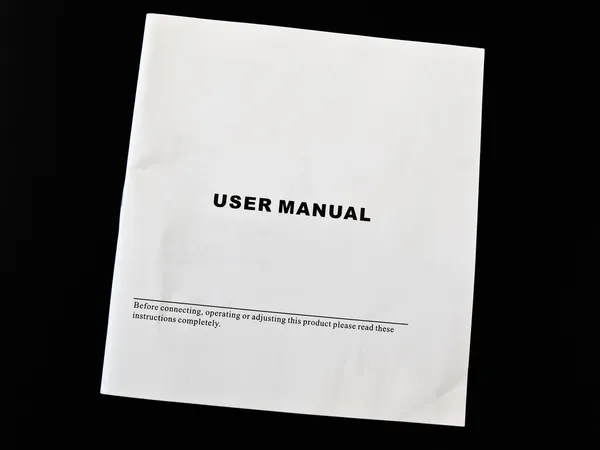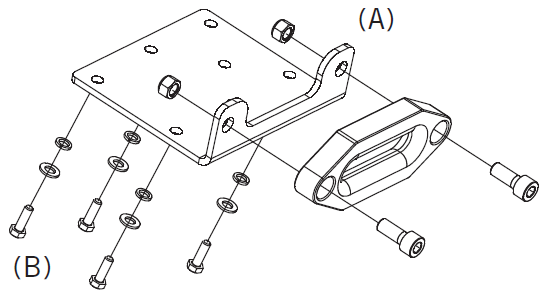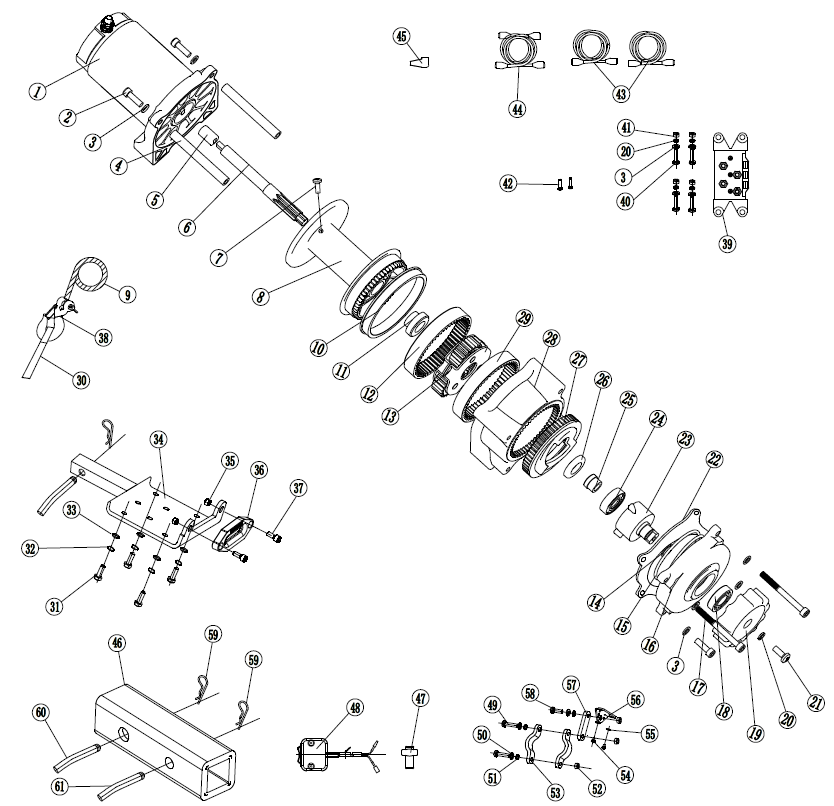CHAMPION GLOBAL POWER EQUIPMENT Synthetic Rope Winch Kit
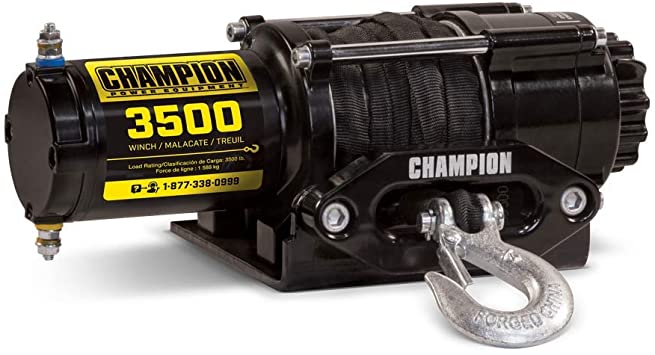
INTRODUCTION
Congratulations on your purchase of a Champion Power Equipment (CPE) product. CPE designs, builds, and supports all of our products to strict specifications and guidelines. With proper product knowledge, safe use, and regular maintenance, this product should bring years of satisfying service.Every effort has been made to ensure the accuracy and completeness of the information in this manual, and we reserve the right to change, alter and/or improve the product and this document at any time without prior notice.Since CPE highly values how our products are designed, manufactured, operated and serviced, and also highly value your safety and the safety of others, we would like you to take the time to review this product manual and other product materials thoroughly and be fully aware and knowledgeable of the assembly, operation, dangers and maintenance of the product before use. Fully familiarize yourself, and make sure others who plan on operating the product fully familiarize themselves too, with the proper safety and operation procedures before each use. Please always exercise common sense and always err on the side of caution when operating the product to ensure no accidents, property damage, or injury occurs. We want you to continue to use and be satisfied with your CPE product for years to come.
This manual uses the following symbols to help differentiate between different kinds of information. The safety symbol is used with a keyword to alert you to potential hazards in operating and owning power equipment.Follow all safety messages to avoid or reduce the risk of serious injury or death.
SAFETY
- indicates an imminently hazardous situation which, if not avoided, will result in death or serious injury.
- indicates a potentially hazardous situation which, if not avoided, could result in death or serious injury.
- indicates a potentially hazardous situation which, if not avoided, may result in minor or moderate injury
- used without the safety alert symbol indicates a potentially hazardous situation which, if not avoided, may result in property damage.
- If you have questions regarding your winch, we can help. Please call our help line at 1-877-338-0999.
- Read this manual thoroughly before operating your winch. Failure to follow instructions could result in serious injury or death.
- Cancer and Reproductive Harm – www.P65Warnings.ca.gov
- Do not exceed the rated capacity.
- Do not use this winch for lifting or moving people or animals.
- Keep yourself and others a safe distance to the side of the synthetic rope when under tension.
- Never step over a synthetic rope or near a synthetic rope under load.
- The synthetic rope may break before the motor stalls. For heavy loads at or near rated capacity, use a pulley block/snatch block to reduce the load on the synthetic rope.
- Do not move the vehicle to pull a load (towing) on the winch synthetic rope. This could result in synthetic rope breakage.
- Pull only on areas of the vehicle as specified by the vehicle manufacturer.
- Do not use the winch to secure or hold a vehicle for a long period of time. Do not use the winch to secure a vehicle for transport.
- Disconnect the remote control and battery leads when not in use.
- Avoid “shock loads” by using the control switch intermittently to take up the slack in the synthetic rope. “Shock loads” can far exceed the rate capacity for the synthetic rope and drum.
- Do not accelerate your vehicle while winching. Loss of traction can cause a shock load on the synthetic rope.
- Batteries contain acid and produce explosive gases.
- Keep sparks, flames and cigarettes away from batteries at all times. Wear safety glasses and protect the eyes at all times. Do not lean over the batteries during operation.
- When re-spooling the synthetic rope, ensure that the synthetic rope spools in the underwind position with the synthetic rope entering the drum from the bottom, not the top. To re-spool correctly, and while wearing gloves, keep a slight load on the synthetic rope while pushing the remote button to draw in the synthetic rope. Walk toward the winch and do not allow the synthetic rope to slide through your hands. Do not let your hands get within 12 in. (30 cm) of the winch while re-spooling. Turn off the winch and repeat the procedure until a few feet of synthetic rope are left. Disconnect the remote control and finish spooling by rotating the drum by hand with the clutch disengaged. Keep hands clear of the fairlead and drum while the winch is under power .
- Do not use as a hoist. Do not use for overhead lifting.
- Use gloves to protect hands when handling the synthetic rope. Never let the synthetic rope slide through your hands.
- Do not wrap the synthetic rope around any object and hook it back onto itself.
- Apply blocks to the wheels of the vehicle when on an incline.
- Duration of winching pulls should be kept as short as possible. If the motor becomes uncomfortably hot to the touch, stop winching immediately and let it cool down for a few minutes. Do not pull for more than one minute at or near the rated load.
- If the motor stalls, do not maintain power to the winch. Electric winches are designed and made for intermittent use and should not be used in constant duty applications.
- Never release the free-spool clutch when there is a load on the winch.
- Use hook strap when handling the hook for spooling or unspooling the synthetic rope.
CONTROLS AND FEATURES
Read this owner’s manual before operating your winch. Familiarize yourself with the location and function of the controls and features. Save this manual for future reference.
Winch
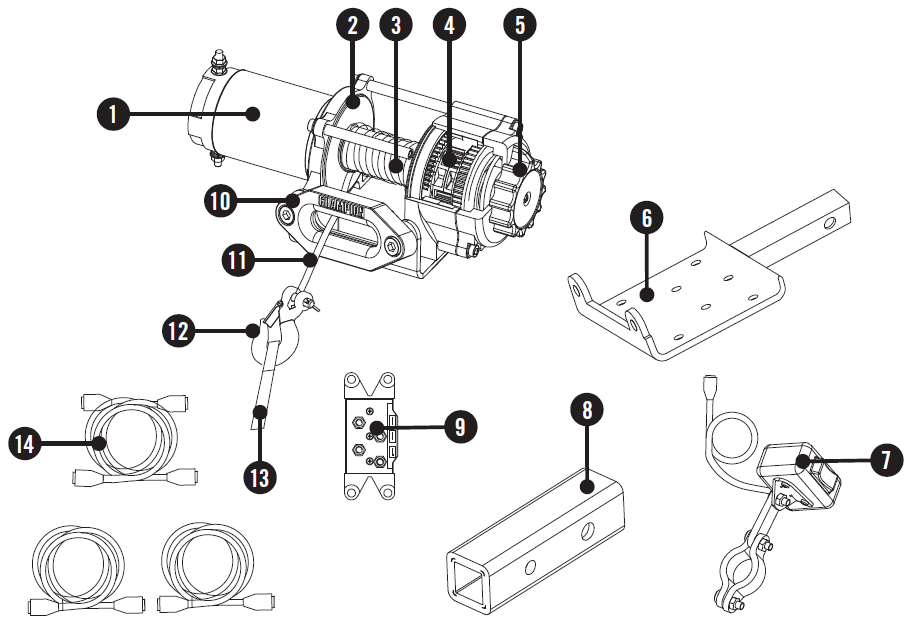
- Motor – 1.2 HP 12V DC motor provides power to the planetary gear mechanism.
- Braking System – Braking action is automatically applied to the winch drum when the winch motor is stopped and there is a load on the synthetic rope.
- Winch Drum – The winch drum is the cylinder on which the synthetic rope is stored. It can feed or wind the rope depending on the remote winch switch.
- Planetary Gear System – The reduction gears convert the winch motor power into extreme pulling forces. This system allows high torque while maintaining compact size and light weight.
- Free Spooling Clutch – The clutch allows the operator to manually disengage (“Out”) the spooling drum from the gear train, free spool. Engaging the clutch (“In”) locks the winch into the gear system.
- Speed Mount™ Hitch Adapter – Flatbed mounting channel, Hitch bar with pin and lock.
- Rocker Switch – Rocker switch with handlebar mount for powering the rope in or out of your winch drum.
- 1¼ in. to 2 in. Hitch Adapter
- Solenoid/Contactor – Power from the vehicle battery flows through the weather sealed contactor before being directed to the winch motor.
- Aluminum Hawse Fairlead – When using the winch at an angle the hawse acts to guide the synthetic rope onto the drum.
- Synthetic Rope – Synthetic rope designed specifically for load capacity of 2,750 lb.(1,247 kg). The synthetic rope feeds onto the drum in the “under wind” position through the aluminum hawse and is looped at the end to accept the clevis hook pin.
- Clevis Hook – Provides a means for connecting the looped ends of synthetic ropes to an anchor.
- Strap – Used to assist synthetic rope feed.
- Winch Connection Cables – Used to connect the contactor to the winch motor.
ASSEMBLY
Mounting the Winch
This CPE 1,247 kg (2,750 lb.) winch is designed with a bolt pattern that is standard in this class of winch. Many winch mounting kits are available that utilize this bolt pattern for the most popular ATVs and UTVs. If you cannot find a kit locally, contact CPE and we will provide you with the name of a dealer.
CAUTION: Mounting bolts must be SAE grade 5 or better and torque to 34 ft. lb.
- Insert two (2) M10x25 bolts to the mounting channel hole and attach the aluminum hawse to the mounting channel with the two (2) M10 nut provided. (A)

- Turn the winch upside down. Place the mounting channel on the winch, making sure the winch is centred in the middle of it.
- Thread the M8x25 bolts through the M8 flat and lockers washers, and then thread through the mounting channel. Tighten the bolts. DO NOT over tighten. (B)
- Turn winch right side up. Disengage the clutch by moving the Cam Ring to the “Out” position. Release the synthetic rope and pull through the aluminum hawse.
- Attach the clevis hook to the synthetic rope, and then hand strap to the clevis hook.
CAUTION: If utilizing a mounting plate, ensure that the three major sections (motor, drum and gear housing) are properly aligned. Proper alignment of the winch will allow for even distribution of the full rated load.
NOTE: The type of vehicle to which the winch and mounting channel will be applied, will dictate the type of mounting kit that should be used (Speed Mount Hitch Adapter, Standard Mounting Channel, or Specialty Mounting Kit).
Mounting the Control Switch
- The control switch is usually installed on the left handlebar.
- Use a piece of electrical tape around the handlebar to help prevent rotation of the mount on the handlebar. Do NOT tighten over any hoses or cables.
- Once the control switch is mounted you can route the wires back to the battery and winch.
- Make sure the handlebars have full range of motion and then secure the control switch’s cable.
Winch Wiring
CAUTION:
- Never route electrical cables across any sharp edges, through or near moving parts, or near parts that become hot.
- Battery cables should not be drawn taut. Leave some slack for cable movement.
NOTE
- You may need to use a test light to locate a suitable wire. The wire should only have power when the key is in the ON position.
- Depending on the location of the solenoid/ contactor, you may need to use the black and red cables in place of the yellow and blue, and the yellow and blue in place of the red and black. Just remember that this also changes the diagram.
- Connect the yellow and blue cables to the motor terminals on the winch. (Yellow to the positive (+) terminal of the motor. Blue to the negative (-) terminal of the motor). Tighten the terminal nuts on the motor. DO NOT over tighten. Route the other ends to the solenoid/ contactor location.
- Connect the yellow and blue cables to the solenoid/contactor (yellow to yellow and blue to blue). DO NOT tighten nuts.
- Connect the red and black cables to the solenoid/contactor (red to red and black to black). DO NOT tighten nuts. Route the other ends to the vehicle’s battery.
- Connect the red lead to the positive (+) terminal of the vehicle’s 12 volt battery.
- Connect the rocker switch to the solenoid/ contactor (black to black and green to green).
- Splice the end of the red wire on the rocker switch, to an ignition (keyed) controlled power source using the supplied wire tap.
- Once all wiring is connected to the solenoid/ contactor it can then be mounted using the supplied M6 hardware.
- Tighten the solenoid/contactor terminal nuts. DO NOT over tighten.
- Connect the black lead to the negative (-) terminal of the vehicle’s 12 volt battery.
- Place all terminal boots over terminals and secure all cables with cable ties or electrical tape (not included).
- Check for proper drum rotation. Pull and turn the clutch knob to the “Out” position (free spooling). Pull out some cable from the drum, and then turn the clutch knob to the “In” position to engage the gears. Press the cable out button on the rocker switch. If the drum is turning and releasing more cable, then your connections are accurate. If the drum is turning and collecting more cable then reverse the leads on the motor. Repeat and check rotation.
With some applications the motor leads may need to be rotated to avoid interference with other components.
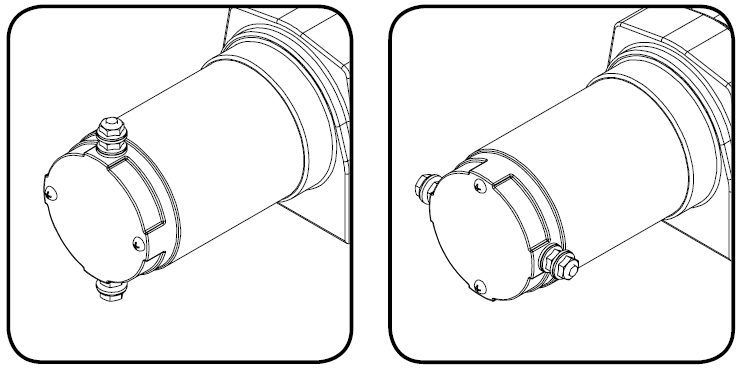
Wiring Diagram
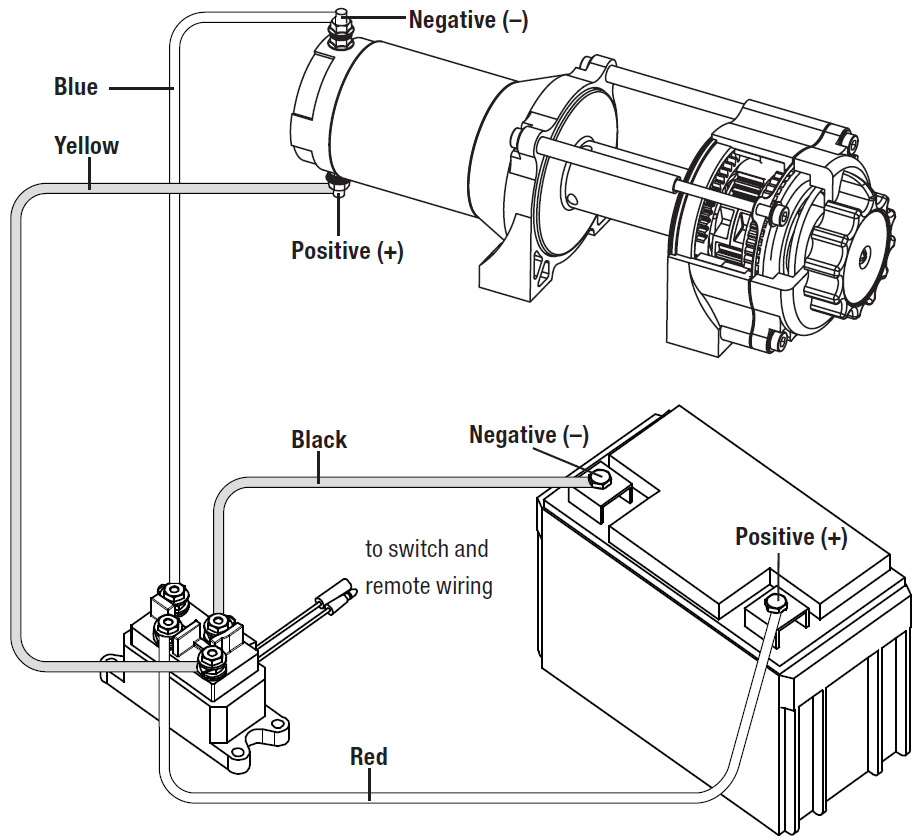
Switch Wiring Diagram
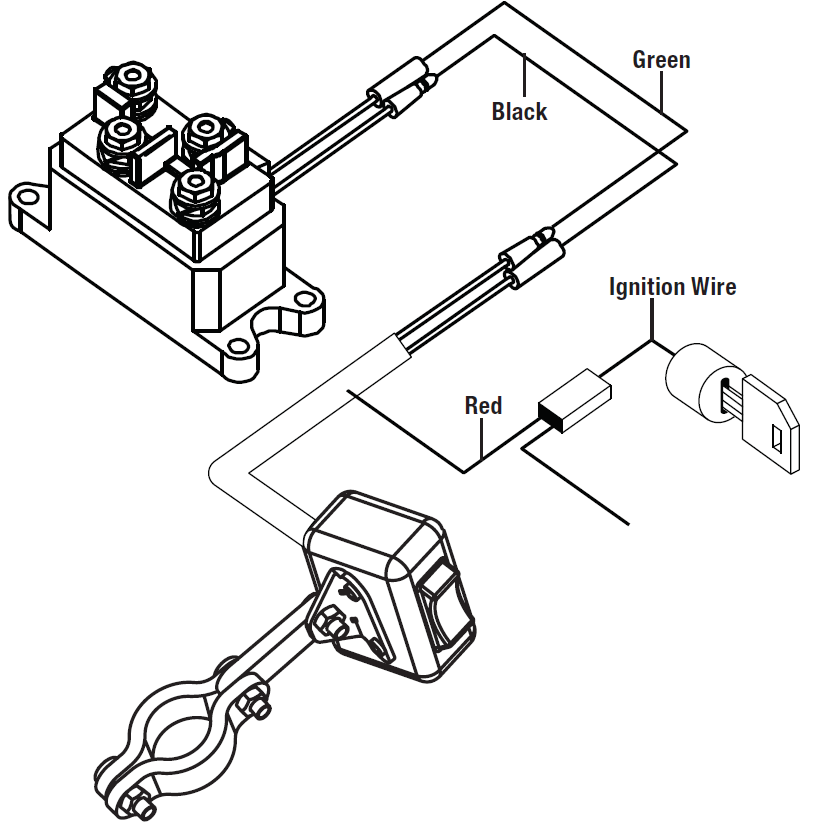
OPERATION
General Tips for Safe Operation
Overloads can damage the winch, motor and/or rope. In some cases, you may find yourself needing more pulling power. For loads over 50% winch rating when spooling on the first rope layer we recommend the use of the pulley/snatch block to double the synthetic rope line. The use of the pulley/snatch block increases mechanical advantage and will:
- Effectively double winching power
- Reduce the number of rope layers on the drum, and
- Reduce the load on the rope by as much as 50%
To review Line Pull and Cable Capacity please refer to Specifications Section found within the manual.When doubling the line back to the vehicle, attach to the tow hook, frame or other load-bearing part. The vehicle engine should be kept running during operation of the winch to minimize battery drain and maximize power and speed of the winch. If the winch is used for a considerable time with the engine off the battery may be drained and too weak to restart the motor.Get to know your winch before you actually need to use it. We recommend that you set up a few test runs to familiarize yourself with rigging techniques, the sounds your winch makes under various loads, the way the synthetic rope spools on the drum, etc.Inspect the synthetic rope and equipment before each use. A frayed or damaged rope should be replaced immediately. Use only manufacturer’s identical replacement rope with the exact specifications.Inspect the winch installation and bolts to ensure that all bolts are tight before each operation. Store the remote control inside your vehicle in a place where it will not be damaged.Any winch that appears to be damaged in any way, is found to be worn, or operates abnormally MUST BE REMOVED FROM SERVICE UNTIL
General Tips for Safe Operation Cont’d. REPAIRED. It is recommended that the necessary repairs be made by a manufacturer’s authorized repair facility.Pull only on areas of the vehicle as specified by the vehicle manufacturer. Only attachments and/or adapters supplied by the manufacturer are to be used.
Self Recovery
Locate a suitable anchor such as a strong tree trunk or boulder. Always use a sling as an anchor point.
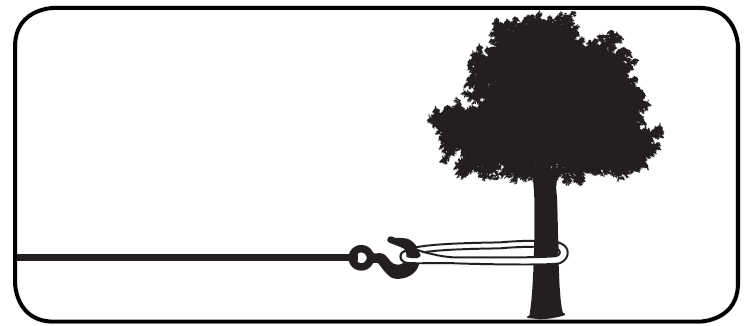
Your winch is equipped with an aluminum hawse to help guide the synthetic rope and to reduce binding on short side pulls. Do not winch from an acute angle as the synthetic rope will pile up on one side of the drum causing damage to synthetic rope and the winch.
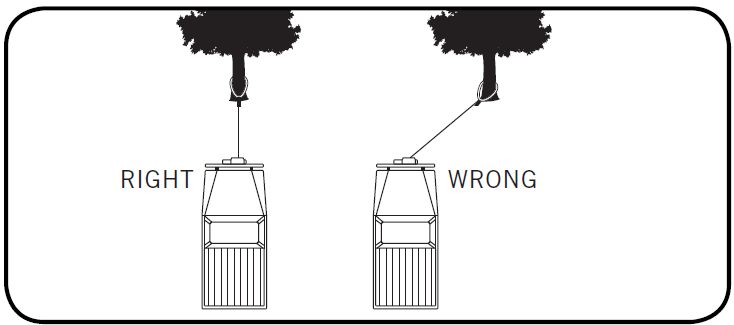
Short pulls from an angle can be used to straighten the vehicle. Long pulls should be done with the synthetic rope at a 90° angle to the winch/vehicle.When pulling a heavy load, place a blanket or jacket over the synthetic rope 5 to 6 ft. (1.5 to 1.8 m) from the hook.
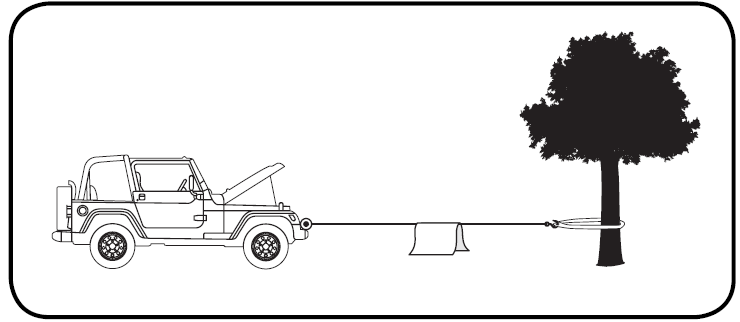
In the event of a broken synthetic rope it will dampen the snap back. For additional protection open the hood of the vehicle. For loads over 50% winch rating when spooling on ï¬rst rope layer, we recommend the use of the snatch block/pulley block (not included) to double line the synthetic rope. This reduces the load on the winch and the
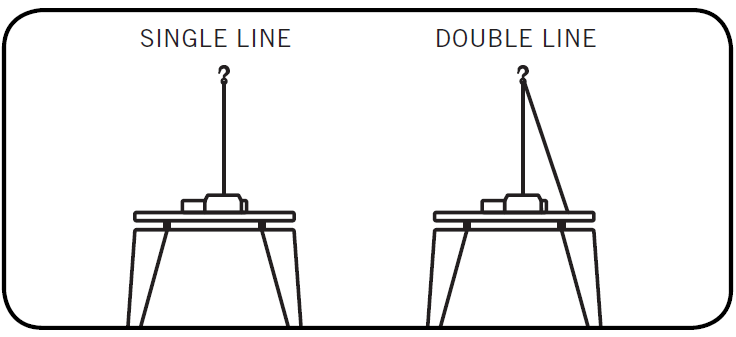
Winching Techniques A-Z
(a) Take time to assess your situation and plan your pull.(b) Put on gloves to protect your hands.(c) Disengage the clutch to allow free-spooling and also save battery power.(d) Attach the hook strap to the clevis hook.(e) Pull out the synthetic rope to your desired anchor point using the hook strap.(f) Secure the clevis hook to the anchor point: sling, chain or snatch block. Do not attach the hook back onto the synthetic rope.(g) Engage the clutch.(h) Connect the remote control to the winch.If you are going to control the winch from inside your vehicle, then pass the remote through an open window to avoid the wires being pinched in the door.(i) Start your engine to ensure power is being replenished to the battery.(j) Drape a blanket or jacket over the synthetic rope approximately 5 ft. – 6 ft. (1.5 m – 1.8 m) from the hook. Open the hood for added protection.(k) Power in the synthetic rope guiding the rope under tension to draw up the slack in the rope. Once the rope is under tension, stand clear. Never step over the synthetic rope.(l) Double check your anchors and make sure all connections are secure.(m) Inspect the synthetic rope. Make sure there are at least 5 wraps of synthetic rope around the winch drum.(n) Clear the area. Make sure all spectators stand clear and that no one is directly in front or behind the vehicle or anchor point.(o) Begin winching. Be sure that the synthetic rope is winding evenly and tightly around the drum. The vehicle that is being winched can be slowly driven to add assistance to the winching process. Avoid shock loads; keep the synthetic rope under tension.(p) The vehicle to be winched should be placed in neutral and the emergency brake released. Only release the brake pedal when under full tension. Avoid shock loads to the winch. This can damage the winch, rope and vehicle.(q) The winch is meant for intermittent use. Under full load with a single-line rig, do not power in for more than a minute without letting the motor cool down for a few minutes and then resume the winching operation.(r) The winching operation is complete once the vehicle is on stable ground and is able to drive under its own power.(s) Secure the vehicle. Be sure to set the brakes and place the vehicle in park.(t) Release the tension on the synthetic rope. The winch is not meant to hold the vehicle for long periods of time.(u) Disconnect the synthetic rope from the anchor.(v) Rewind the synthetic rope. Make sure that any rope already on the drum has spooled tightly and neatly. If not, draw out the rope and re-spool from the point where the rope is tight.(w) Keep your hands clear of the winch drum and fairlead as the synthetic rope is being drawn in.(x) Secure the hook and hook strap.(y) Disconnect the remote control and store in a clean, dry place.(z) Clean and inspect connections and mounting hardware for next winching operation.
MAINTENANCE
The owner/operator is responsible for all periodic maintenance.
WARNING:
- Never operate a damaged or defective winch.
- Improper maintenance will void your warranty.
Complete all scheduled maintenance in a timely manner. Correct any issue before operating the winch.
LubricationAll moving parts within the electric winch have been lubricated using high-temperature lithium grease at the factory. No internal lubrication is required.
Cable Assembly Replacement
It is recommended that any modifications be performed by a manufacturer’s authorized repair facility, and that only manufacturer-supplied parts be used.
- Move the clutch to the “Out” position.
- Extend cable assembly to its full length. Note how the existing synthetic rope is connected to the inside of the drum.
- Remove old cable assembly and attach new one.
- Retract cable assembly onto drum, being careful not to allow kinking.
Synthetic Rope Replacement
It is recommended that any modifications be performed by a manufacturer authorized repair facility, and that only manufacturer-supplied parts be used.
- Move the clutch to the “Out” position.
- Extend synthetic rope to its full length. Note how the existing rope is connected to the inside of the drum.
- Remove old synthetic rope and attach new one.
- Retract synthetic rope onto drum being careful not to allow kinking.
Synthetic RopePeriodically rinse the synthetic rope with water to remove any sand, dirt, mud, or debris that can become embedded or build up in the rope during use. This will help extend the life of the rope.
Performance Specifications
- Rated Pull . . . . . . . . . . . . . . . . . . . . . . . . . . . . . . . . . . . . . 2,750 lb. (1,247 kg)
- Gear Reduction Ratio . . . . . . . . . . . . . . . . . . . . . . . . . . . . . . . . . . . . . . . 171:1
- Motor . . . . . . . . . . . . . . . . . . . . . . . . . . . Permanent Magnet 1.2 HP/0.9 kW (12V DC)
- Duty Cycle . . . . . . . . . . . . . . . . . . . . . . . . . . . . . . . . . . . . . Intermittent Use Only
- Drum Size . . . . . . . . . . . . . . . . . . . . . 1.5 in. (D) × 3.2 in. (L) [38 mm (D) × 80 mm (L)]
- Synthetic Rope . . . . . . . . . . . . . . . . . . 3/16 in. (D) × 50 ft. (L) [4.8 mm (D) × 15.2 m (L)]
- Gross Weight . . . . . . . . . . . . . . . . . . . . . . . . . . . . . . . . . . . . . . 27.3 lb (12.4 kg)
- Net Weight . . . . . . . . . . . . . . . . . . . . . . . . . . . . . . . . . . . . . . . 25.1 lb (11.4 kg)
- Height . . . . . . . . . . . . . . . . . . . . . . . . . . . . . . . . . . . . . . . . . . 4.4 in. (11.2 cm)
- Width . . . . . . . . . . . . . . . . . . . . . . . . . . . . . . . . . . . . . . . . . . 4.1 in. (10.3 cm)
- Length . . . . . . . . . . . . . . . . . . . . . . . . . . . . . . . . . . . . . . . . 12.7 in. (32.2 cm)
- Bolt Pattern. . . . . . . . . . . . . . . . . . . . . . . . . . . . . 4.9 in. × 3 in. (12.4 cm × 7.6 cm)
Parts Diagram
WARRANTY*
CHAMPION POWER EQUIPMENT
2 YEAR LIMITED WARRANTYWarranty QualificationsTo register your product for warranty and FREE lifetime call center technical support please visit: https://www.championpowerequipment.com/register To complete registration you will need to include a copy of the purchase receipt as proof of original purchase. Proof of purchase is required for warranty service. Please register within ten (10) days from date of purchase.
Repair/Replacement WarrantyCPE warrants to the original purchaser that the mechanical and electrical components will be free of defects in material and workmanship for a period of two years (parts and labor) from the original date of purchase and 180 days (parts and labor) for commercial and industrial use. Transportation charges on product submitted for repair or replacement under this warranty are the sole responsibility of the purchaser. This warranty only applies to the original purchaser and is not transferable.
Do Not Return The Unit To The Place Of PurchaseContact CPE’s Technical Service and CPE will troubleshoot any issue via phone or e-mail. If the problem is not corrected by this method, CPE may, at its option, authorize other means of repair and/or replacement.
Limits of Implied Warranty and Consequential DamageChampion Power Equipment disclaims any obligation to cover any loss of time, use of this product, freight, or any incidental or consequential claim by anyone from using this product. THIS WARRANTY IS IN LIEU OF ALL OTHER WARRANTIES, EXPRESS OR IMPLIED, INCLUDING WARRANTIES OF MERCHANTABILITY OR FITNESS FOR A PARTICULAR PURPOSE.A unit provided as an exchange will be subject to the warranty of the original unit. The length of the warranty governing the exchanged unit will remain calculated by reference to the purchase date of the original unit.This warranty gives you certain legal rights which may change from state to state or province to province. Your state or province may also have other rights you may be entitled to that are not listed within this warranty.
Contact Information
Address: Champion Power Equipment, Inc. 12039 Smith Ave.Santa Fe Springs, CA 90670 USAwww.championpowerequipment.com
Customer ServiceMon – Fri 8:30 AM – 5:00 PM (PST/PDT)Toll Free: 1-877-338-0999[email protected]Fax no.: 1-562-236-9429
Technical ServiceMon – Fri 8:30 AM – 5:00 PM (PST/PDT)Toll Free: 1-877-338-0999[email protected]24/7 Tech Support: 1-562-204-1188
For further technical support:
Technical ServiceMon – Fri 8:30 AM – 5:00 PM (PST/PDT)Toll Free: 1-877-338-0999[email protected]
References
[xyz-ips snippet=”download-snippet”]

